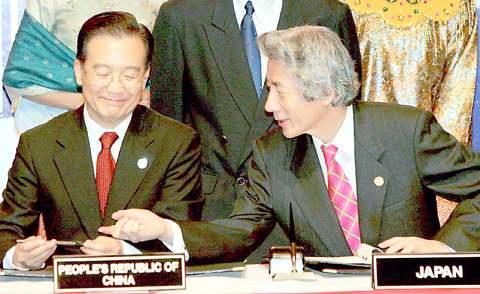Where frosty relations between China and Japan are concerned, the pen is mightier than the sword.
Chinese Premier Wen Jiabao (溫家寶) appeared to make clear his continuing displeasure with Japanese Prime Minister Junichiro Koizumi when he ignored Koizumi's request to borrow his pen at a signing ceremony yesterday at the East Asia Summit in Malaysia.
Wen had already refused to formally meet one-on-one with Koizumi at the summit amid a feud over the Japanese leader's visits to a shrine honoring war dead, including those executed for war crimes committed in China and elsewhere.

PHOTO: EPA
As leaders of the newly inaugurated East Asia Summit were signing a declaration on the group's establishment, Koizumi, seated next to Wen, leaned over and asked to borrow his pen.
Wen ignored him for several seconds until Malaysian Prime Minister Abdullah Ahmad Badawi, smiling broadly, intervened to repeat the request.
Wen then passed the pen to Koizumi with a smile, but the incident was widely noted amid an otherwise uneventful ceremony that concluded the 16-nation summit's formal business.
The snub came just a day after Koizumi said that he failed to understand why Wen had allowed the disagreement to spoil their meeting.
"No two nations are without their share of differences. I cannot understand why China won't have a meeting because of one problem," Koizumi said.
Wen on Monday had said Koizumi was fully responsible for the freeze in high-level contacts because his five visits to Tokyo's Yasukuni shrine while serving as prime minister had "deeply hurt the feelings of the Chinese people."
Wen has ignored most of Koizumi's attempts at affability during the summit's group photos and other public events, although the men did banter about seafood during a luncheon on Monday.
Addressing a news conference later, Abdullah refused to comment on the incident.
"Don't read into body language. I don't want to read into that," Abdullah said.
However, he added, that the China-Japan row had not affected the summit.
"They were participating in the discussions. They were sitting together ... they will sort it out," he said.

DAREDEVIL: Honnold said it had always been a dream of his to climb Taipei 101, while a Netflix producer said the skyscraper was ‘a real icon of this country’ US climber Alex Honnold yesterday took on Taiwan’s tallest building, becoming the first person to scale Taipei 101 without a rope, harness or safety net. Hundreds of spectators gathered at the base of the 101-story skyscraper to watch Honnold, 40, embark on his daredevil feat, which was also broadcast live on Netflix. Dressed in a red T-shirt and yellow custom-made climbing shoes, Honnold swiftly moved up the southeast face of the glass and steel building. At one point, he stepped onto a platform midway up to wave down at fans and onlookers who were taking photos. People watching from inside

A Vietnamese migrant worker yesterday won NT$12 million (US$379,627) on a Lunar New Year scratch card in Kaohsiung as part of Taiwan Lottery Co’s (台灣彩券) “NT$12 Million Grand Fortune” (1200萬大吉利) game. The man was the first top-prize winner of the new game launched on Jan. 6 to mark the Lunar New Year. Three Vietnamese migrant workers visited a Taiwan Lottery shop on Xinyue Street in Kaohsiung’s Gangshan District (崗山), a store representative said. The player bought multiple tickets and, after winning nothing, held the final lottery ticket in one hand and rubbed the store’s statue of the Maitreya Buddha’s belly with the other,

‘NATO-PLUS’: ‘Our strategic partners in the Indo-Pacific are facing increasing aggression by the Chinese Communist Party,’ US Representative Rob Wittman said The US House of Representatives on Monday released its version of the Consolidated Appropriations Act, which includes US$1.15 billion to support security cooperation with Taiwan. The omnibus act, covering US$1.2 trillion of spending, allocates US$1 billion for the Taiwan Security Cooperation Initiative, as well as US$150 million for the replacement of defense articles and reimbursement of defense services provided to Taiwan. The fund allocations were based on the US National Defense Authorization Act for fiscal 2026 that was passed by the US Congress last month and authorized up to US$1 billion to the US Defense Security Cooperation Agency in support of the

‘COMMITTED TO DETERRENCE’: Washington would stand by its allies, but it can only help as much as countries help themselves, Raymond Greene said The US is committed to deterrence in the first island chain, but it should not bear the burden alone, as “freedom is not free,” American Institute in Taiwan Director Raymond Greene said in a speech at the Institute for National Defense and Security Research’s “Strengthening Resilience: Defense as the Engine of Development” seminar in Taipei yesterday. In the speech, titled “Investing Together and a Secure and Prosperous Future,” Greene highlighted the contributions of US President Donald Trump’s administration to Taiwan’s defense efforts, including the establishment of supply chains for drones and autonomous systems, offers of security assistance and the expansion of